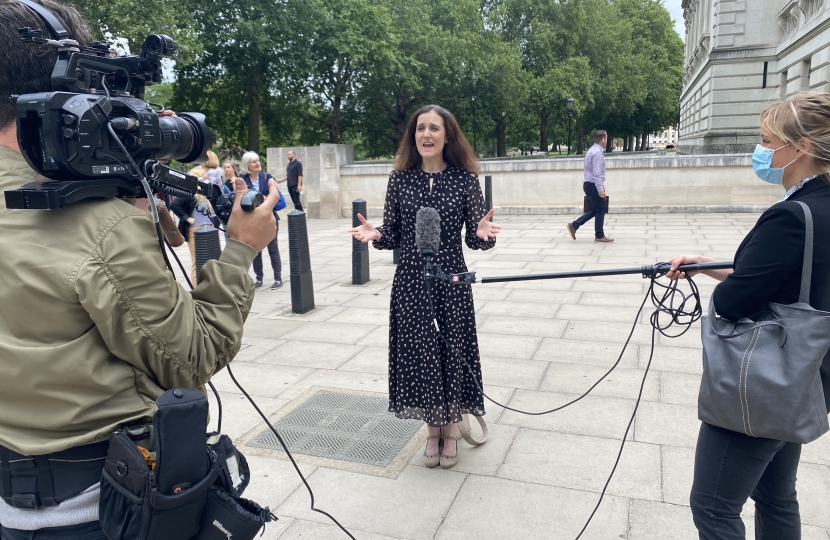
A House of Commons debate on Thursday on Parliamentary petitions signed by nearly three quarters of a million people was led by Theresa Villiers. MPs highlighted sectors which face the most serious economic problems as a result of the Covid lockdown. In her speech, Ms Villiers highlighted workers falling outside the Government's extensive support package, as well as sectors, such as the arts, theatre and culture, which are hard hit because they may not be able to re-open for several months:
"The volume of signatures on parliamentary petitions has been huge in recent weeks, reflecting the immense public anxiety about the health emergency we have been living through. I thank every one of the 641,986 people who signed the five petitions that reached the 100,000 threshold and that we are considering today. They are on support for the events industry; for the arts, theatre and music; for zoos, aquariums, and rescue centres; for nursery and childcare providers; and for aviation. I also thank the 74,735 people who have backed seven other petitions that are also relevant. Those petitions are on help for performers and creators; for pubs and hospitality; for early years providers; for wholesalers; for health businesses; and for small businesses.
There is no escaping the devastating impact the covid emergency has had on our economy. That is unavoidable when vast swathes of business activity are shut down. But the Government have listened and have heard the calls to intervene, from the 12 e-petitions and from millions of other people afraid for their livelihoods and their future, including many in Chipping Barnet, and I thank the Government for their intervention. At immense speed, the Government put in place the biggest package of help for jobs, livelihoods and businesses in our nation’s history.
Through the furlough scheme, the Government are paying the wages of more than 9.1 million workers, providing £20.8 billion to more than 1 million employers. More than 2.6 million people have received grants from the self-employed income support scheme, which is one of the more generous in the world. More than 863,000 companies have received bounce-back loans—these have been worth more than £26 billion.
Some £10 billion has been lent to 49,000 firms under CBILS—the coronavirus business interruption loan scheme. Small businesses in the retail, hospitality and leisure sector have received cash grants of up to £25,000 and been given a 12 month business rates holiday. A £1.25 billion package is available for start-ups, and £30 billion of VAT payments have been suspended for three months. Some 68,000 businesses have benefited from the deferral of other taxes, and smaller businesses have received help with funding sick pay.
Without that bold and radical intervention by the Government, and the speed at which it has been delivered, our situation today in this country would be far, far worse, as the Office for Budget Responsibility, the International Monetary Fund, the OECD and the Bank of England have all confirmed. Unemployment would have rocketed and thousands of businesses would have gone bust, both in the sectors highlighted in the 12 e-petitions and in many others. There has been extensive backing for what the Government have done, including from Len McCluskey, of Unite, who said of the furlough scheme:
“We recognise that these are huge decisions for any government, and especially for a Conservative government, but they have listened to the calls for action and have acted appropriately. Rishi Sunak’s wage support measures are a historic first for this country, but are bold and very much necessary…This will definitely be some relief amid all the fear in households across the UK this evening.”
However, were it not for the difficult decisions taken by Conservative-led Governments since 2010, we would not have been able to respond in this way or on this scale. It is only if you fix the roof while the sun is shining that you have the resources and the balance sheet to intervene aggressively to provide the kind of action called for in these petitions. Sadly, we all know from our inboxes that, even with the scale of what we are doing, there are gaps in support. In an economic disaster as great as this one—possibly the worst for 300 years—there are inevitably still many people facing hardship and uncertainty about their future. I hope that the Minister will consider whether any further help is possible for the sectors highlighted in the 12 e-petitions....
That includes the arts, events, theatre, performance, musicians, actors and creators. With no date set for the resumption of events and performances in theatres or music venues, this crucial part of our economy could be the hardest hit of all of them. The future of our regional theatres in particular looks perilous. Adrian Vinken, chief executive of the Theatre Royal, Plymouth, wrote in the Daily Mail today:
“The entire performing arts industry is…facing oblivion. This is not only a human and economic disaster—it is a cultural catastrophe.”
The insecure and sporadic nature of jobs in the industry means that many workers fall within the gaps in the Government’s covid intervention package. This includes, typically, freelancers who get part of their income through PAYE and part of their income through self-employment. They may not have been in their PAYE contract at the right time to be furloughed, and they may not earn enough of their income from self-employment to qualify for the self-employment income support scheme. As well as considering further funding support for those workers and sectors, we must have a clear plan to get theatres and venues open and to get events starting again, as has been managed in countries such as South Korea.
It is also really important to reflect on aviation, which, as the petitions highlight, is also hard hit. We need the air bridges in action. Blanket quarantine requirements will make it a hundred times more difficult for aviation to recover, and it is hard to understand the need for quarantine for people coming from places that have fewer covid cases than we do. I appeal to the Minister for a risk-based approach on quarantine so that travel can start up again and we listen to the petitioners who are demanding help and support for aviation.
Our nurseries and childcare are also mentioned in the petition. I welcome the extension of the business rates holiday, directly implementing one of the demands of petitioners, but Ministers need a firm and funded plan to support the sector in the long term. The early years stage of education is crucial in determining life chances, and if we are to deliver on our promises on social mobility and respond to legitimate concerns on equality of opportunity, we need to help nursery and childcare providers through this crisis and ensure that they are on a stable footing for the long term, including restoring funding for maintained nursery schools....
On zoos and aquariums, I welcome the grants of up to £100,000 offered by the Government to get them through the crisis, again responding directly to the e-petition. I pay tribute to the dedicated work of zoo staff, many of whom went the extra mile to look after the animals in their care, despite lockdown.
Whether it is zoos or nurseries, theatres or airports, hospitality or wholesale, the best shot in the arm the Government can give all these sectors is to let them open for business again. It was, therefore, an immense relief to hear from the Prime Minister that the 1 metre rule, with safeguards, will be introduced in England from 4 July. I have been advocating this for weeks as the only way to save our pubs and hospitality, travel and tourism businesses—and the only way to save the summer holidays.
The multiple schemes I have set out have provided vital life support for the economy and are protecting the livelihoods of millions upon millions of the constituents who vote for us to serve them in this place. They have protected people who would otherwise be facing great hardship and adversity, but their eye-watering cost means it is inevitable that they are time-limited. The only way to put the sectors highlighted in the 12 petitions on to a sound and successful footing for the long term is to let people out of their homes, back to work, back to the shops, and back to the pub. That is starting to happen and I very much welcome the news that 4 July will truly be our independence day as we take the next cautious steps in lifting lockdown and moving on from the covid emergency."
In closing the debate, Ms Villiers asked the Government to consider what help could be provided for workers falling into categories identified by the House of Commons Treasury Select Committee who are missing out on the Covid support package programmes: the newly employed, the newly self-employed, directors of limited companies, and freelancers on short-term contracts.
Commenting after the debate, the MP for Chipping Barnet said "Whilst the Government's support package is bigger than anything ever delivered before in history, I continue to worry about constituents who fall outside the furlough and self-employed schemes and I welcome the change to speak up for them today."


